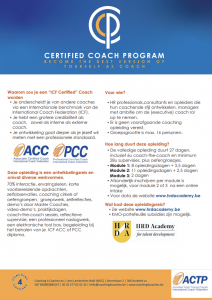- You will learn in-depth coaching based on the 8 ICF competences. You can download the ICF competency model here.
- You learn how to coach at behavioural and competence level and how to achieve perception expansion.
- During this program, you develop your own coaching style and put your personal emphasis on becoming the best version of yourself as a coach.
- You learn to coach on a persuasive level.
- You learn how to deal with emotions in coaching, both your own and those of your coachee.
- You sharpen your quality of being fully present as a coach.
- You acquire a basis for coaching on identity and beliefs.
- After completing the entire Certified Coach Program, you will be able to coach at the level of Professional Certified Coach as described by ICF.
If you successfully complete the CCP – Fundamentals Module, CCP – Advanced Module and the CCP – Certification Module, i.e. the entire Certified Coach Program, you can apply for the PCC (Professional Certified Coach) certificate directly with the ICF via the ACTP route.
CCP – Fundamentals Module 1
Block 1: Coaching as a role, style, skill, attitude and profession
- What is coaching and at what levels do you coach?
- What is coaching and what is it not?
- The role of the coach and coaching styles and roles.
- The basic attitude and beliefs of the coach.
- The building blocks of a coaching conversation.
- Introduction to the PCC Markers and the ICF competencies.
- The development path of yourself as a coach and your coachee.
- Levels and themes of coaching.
- Coaching and learning and change processes.
- Coaching in relation to other professions.
Block 2: Connection, Co-creation, Deep listening, Powerful questioning
- Listening as a coach vs. listening as a colleague.
- Being connected and observing (self-observer).
- Listening in the here and now: what is/isn’t being said?
- The power and effect of rephrasing in various dimensions.
- Report: Pacing & Leading, Matching & mismatching, …
- Sensory preferences in language.
- Powerful questions about the whole experience: physical, emotional, mental.
- Questioning decision processes.
- Awareness questions versus information questions.
- Co-creation: the deeper meaning.
Block 3: Result Orientation & Direct Communication
- Results-driven vs results-oriented.
- Psychological contracting with your coachee.
- Long- and short-term goals and conversational goals.
- Defining the outcome of a coaching process and breaking it down into coaching themes.
- Motivation questioning.
- Power-focused versus Gap coaching.
- Stimulating values in your coachee.
- Direct communication: re-approach, input of intuition, thoughts and feelings in a coaching manner.
- Reflections in various forms: appreciative and developmental accents.
- Silences, interruption and encouragement.
Block 4: Perception-enhancing methods, Ethics and Contracting
- The change process as a guide during coaching processes.
- Learning processes and hiccups: how to support them as a coach?
- Professional reflection as a basis for continuous growth.
- Questioning perceptual positions for consciousness expansion.
- Working with polarities (from either-or to and-and).
- Talent- alongside competence-based coaching.
- Ethical boundaries – cases and ICF code of ethics.
- Pathway contracts and your coach profile.
Block 5: Integration of Fundamentals at ACC level
- Practical exercises followed by feedback.
CCP – Advanced Module 2
Block 1: Being fully present as a coach
- Distinction between single loop, double loop and triple loop learning.
- Being fully present and coaching from comfort and confidence.
- Reframing: methods and applications.
- Using systemic empathy and intuition.
Block 2: Coaching on beliefs
- Beliefs vs assumptions.
- Learning to listen between the lines for hidden beliefs.
- Distinguishing limiting and empowering beliefs.
- Mirroring beliefs and co-creatively identifying which thoughts are most hindering.
- Questioning the roots of beliefs and deploying a change process to arrive at new beliefs.
- Double loop framing and client consent.
Block 3: Turning limiting beliefs into empowering beliefs and anchoring them emotionally-mentally
- Values: ladders, top values and criteria.
- Transforming limiting beliefs into empowering beliefs through the ‘structure of belief’ and other methods.
- Various methods that strengthen the anchoring process of the new perception.
Block 4: Welcoming emotions and feelings and staying fully present
- Increasing one’s own emotional intelligence.
- The signature theory of emotions: what do they want to tell us?
- Staying fully present with emotions yourself.
- Various methods for working around specific emotions.
- Guiding forgiveness processes.
Block 5: Coaching on identity – a foundation
- What are identity themes in coaching?
- Some methods on coaching self-confidence.
- Working with ‘parts’ of the personality.
- Change versus transition.
- Experiencing the power of metaphors.
- The identity of the coach.
CCP – Certification Module 3 (ACTP Certification)
- Written integration exercise
- Portfolio Reflection: as a participant, you are invited to reflectively describe your learning on double loop.
- Oral Certification at PCC level. During this day, as a participant, you coach an unknown coachee for 30 minutes.
- As a summary, you will receive a report from our master coaches with feedback on your exercises. This feedback is based on the ICF PCC markers.
The full training lasts 27 days, including 6h coach-the-coach and a minimum of 28h mentor-coaching, plus practice groups.
- Module 1 lasts 8 training days + 3.5 days
- Module 2 takes 11 training days + 2.5 days
- Module 3 lasts 2 days.
English spoken trainings are organised on demand. Usually it are in-company courses.
Interested in an English spoken in-company training? Please contact us at leen@certifiedcoachprogram.be



